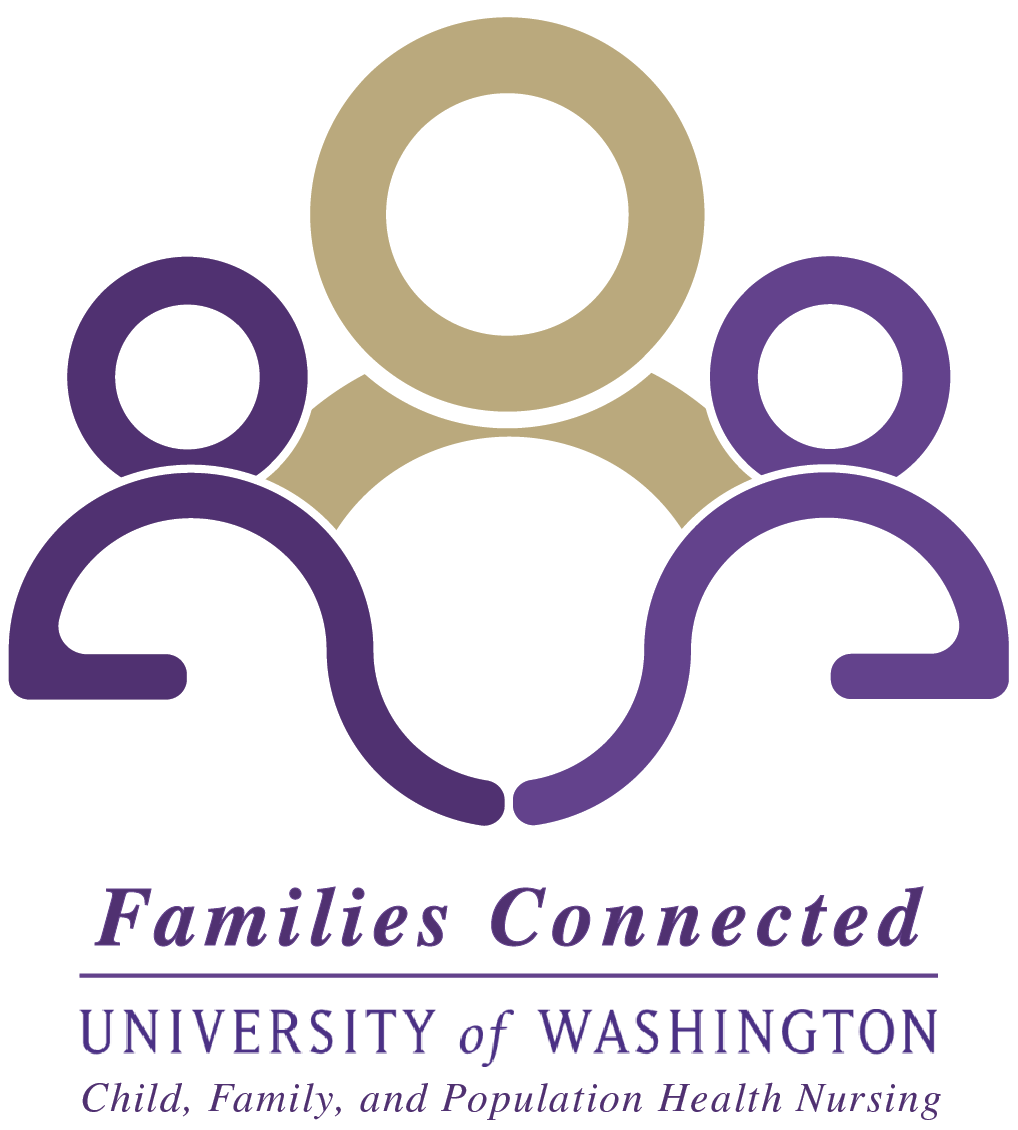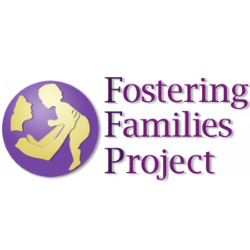Please click here for a full summary of our research findings and results across all completed studies.
Families Connected
The Families Connected Study is an R01 funded by the National Institutes of Child Health and Human Development and is designed to assess if the home visiting program, Promoting First Relationships, is as effective when delivered by Telehealth. We will recruit 357 participants with infants aged 6 - 12 months of age and whose family has a recent investigation in Child Protective Services. Families will be randomized to receive either PFR by home visiting, PFR by Telehealth, or a resource service. The study began recruitment in October 2023. This research is actively recruiting participants, to read about the eligibility criteria click here (Stamped Recruitment document link) and to see the flow of our research click here ((Flow Chart link). This research is actively recruiting participants, to read about the eligibility criteria click here and to see the flow of our research click here . NIH Clinical Trial # NCT04382677
Principal Investigator, Dr. Monica Oxford, and Co-investigator, Dr. Jonika Hash
 Families Together Program
Families Together Program
This R01 study, funded by National Institute of Child Health and Human Development, is a randomized clinical trial designed to assess the effectiveness of Promoting First Relationships® among children aged 1 to 5 years in child welfare who have recently been reunited with their birth parent after a foster care separation. Promoting First Relationships was adapted and evaluated for service with preschool-aged children. We are partnering with Washington State to implement this community-based clinical trial of effectiveness. Sample recruitment is complete, and we are continuing to collect outcome data. Recruitment for this study ended in the summer of 2023, we continue to collect outcome data until mid-2024. Sample recruitment is complete, and we are continuing to collect outcome data. Recruitment for this study ended in the summer of 2023, we continue to collect outcome data until mid-2024. NIH Clinical Trial # NCT06109766
Principal Investigator, Dr. Monica Oxford, and Co-investigator,Dr. Susan Spieker
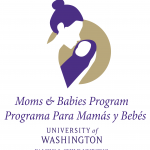 Moms & Babies Program (Programa de Mamás y Bebés)
Moms & Babies Program (Programa de Mamás y Bebés)
This RO1 study, funded by the National Institute of Child Health and Human Development, is a randomized clinical trial designed to evaluate the effectiveness of adding a research-based 10-week home visiting parenting program to Evidence-Based depression treatment, to counter the pernicious effects of mothers’ depression on parenting quality and infant development. Participants will be English and Spanish-speaking low-income mothers who began publicly funded depression treatment in pregnancy at their primary care community health centers and their infants 2-4 months of age.
Principal Investigator, Dr. Susan Spieker, and Co-investigator, Dr. Monica Oxford
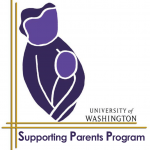 Supporting Parent Program
Supporting Parent Program
This R01 study, funded by the National Institute of Child Health and Human Development, is a randomized clinical trial designed to test the effectiveness of Promoting First Relationships® for 247 birth parents of infants and toddlers identified by Child Protective Services. Results showed the intervention improved observed caregiver sensitivity and knowledge of children’s developmental needs; PFR also improved child’s stress physiology during difficult tasks. Children whose parents received PFR were 2.5 times less likely to be placed in foster care. Published Results
Principal Investigator, Dr. Monica Oxford, and Co-investigator, Dr. Susan Spieker
Fostering Families Program
This R01 study, funded by the National Institute of Mental Health, is a randomized clinical trial designed to test the effectiveness of Promoting First Relationships® for 210 birth, kin and foster caregivers of infants and toddlers in child welfare who recently transitioned into their care. Results showed the intervention improved observed caregiver sensitivity and knowledge of children’s developmental needs. Children improved in social competency and children showed more normalized stimulated cortisol patterns. Children with kin and foster families were more likely to achieve permanency if their caregivers received PFR. Published Results
Principal Investigator, Dr. Susan Spieker, and Co-investigator, Dr. Monica Oxford.
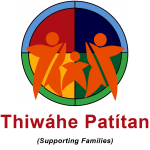 A Primary Prevention Trial to Strengthen Child Attachment in a Native Community
A Primary Prevention Trial to Strengthen Child Attachment in a Native Community
This study, funded by the National Institute on Minority Health and Health Disparities, with MPI’s Oxford, Booth-LaForce & Buchwald, is a randomized clinical trial that has partners with two tribes in the Midwest to adapt and implement infant mental health services using Promoting First Relationships® in a community-based partnership. We will train local providers to implement services using a distance learning program. Once trained community providers will implement a clinical trial using a wait-list control design.
Multiple Principal Investigators, Dr. Cathryn Booth-LaForce, Dr. Monica Oxford, and Dr. Dedra Bushwald
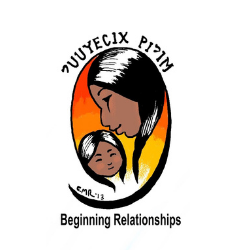 Promoting First Relationships®: Primary Prevention in Two Native Communities
Promoting First Relationships®: Primary Prevention in Two Native Communities
An R01, within a P20, NIMHD Exploratory Centers of Excellence grant in collaboration with UW School of Medicine and Washington State University. MPIs—John Roll & Dedra Buchwald: Behavioral Health Collaborative for Rural American Indian Communities. Using a waitlist design, the aim of this study is to adapt and evaluate the adaption of Promoting First Relationships ® within a tribal community.
Principal Investigators, Dr. Cathryn Booth-LaForce, and Co-investigator, Dr. Monica Oxford

Examining Biomarkers of Emotional Regulation in a Sample of Maltreated Toddler
This study, funded by the Royalty Research Fund, University of Washington, was designed to provide an opportunity to augment an ongoing, longitudinal, clinical trial of a 10-week home visiting intervention with maltreated infants and toddlers. In the parent study, families are receiving one of two interventions in a clinical trial of Promoting First Relationships (PFR; Kelly et al., 2003). We collected collect additional physiological indicators of emotional regulation of infants and toddlers in this sample, specifically respiratory sinus arrhythmia (RSA) during a home visit. Results indicated that children whose parents received PFR demonstrated significantly better emotional regulation than those children in the control group (see Hastings et al., 2018 in SPP Publication List).
Principal Investigator, Dr. Monica Oxford, R01HD061362-02
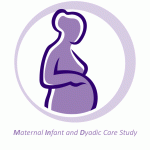 A Dyadic Approach to Perinatal Depression Treatment in Primary Care
A Dyadic Approach to Perinatal Depression Treatment in Primary Care
This project will test a user centered design adaptation of an evidence-based parenting intervention Promoting First Relationships (PFR). We will test this adaptation within a comprehensive perinatal depression treatment model in a collaborative care setting. We will focus on important mediators of worsened postpartum depression (decreased parenting self-efficacy and impaired mother-infant interaction), and test if PFR improves both maternal and child outcomes.
Principal Investigator, Dr. Amritha Bhat, and Co-investigator, Monica Oxford, NIH R34
 Bright Start: Teaching Parenting Skills to At-Risk Mothers
Bright Start: Teaching Parenting Skills to At-Risk Mothers
This study is a collaboration with Seattle Children’s to test the hypothesis that a series of pragmatic, actionable, evidence-based and cost-effective caregiver behaviors can enhance early child-parent attachment as well as the cognitive and emotional development of children 3 years old and younger. The intervention consists of parent education and the provision of specific tools and recommendations for appropriate developmental stimulation after the first three years.
Principal investigator, Dr. Dimitri Christakis and Co-investigator, Dr. Susan Spieker
NICHD Study of Early Child Care and Youth Development (SECCYD) 1991-1999
SECCYD began as the Study of Early Child Care in 1991. Working with more than 1,300 children and their families, the researchers analyzed how different child care arrangements related to measurements of the children's health, behavior, school performance, and other indicators of development in infancy, early childhood, middle childhood, and middle adolescence. https://www.nichd.nih.gov/research/supported/seccyd
For study design and major outcomes click here. https://www.nichd.nih.gov/sites/default/files/publications/pubs/documents/seccyd_06.pdf
Principal Investigator, Dr. Cathryn Booth-LaForce and Co-investigator Dr. Susan Spieker. Funded by the National Institute of Child Health and Development R01
 Drug Use and Parenting Adolescents
Drug Use and Parenting Adolescents
The Young Women's Health Study is a longitudinal study of two groups of young women who became premaritally pregnant at age 17 or younger, and their children. The young women were recruited primarily from public health clinics, social service agencies, and school programs in the greater Seattle area.
We have completed five rounds of funding for the project. The first grant (DUPA1, funded by the National Institute on Drug Abuse—NIDA) began in 1987, and recruited Cohort 1. The second grant recruited Cohort 2 and continued to follow Cohort 1 (DUPA2, funded by NIDA). The third grant continued to follow Cohort 2, and focused on the children (DUPA Kids, funded by the National Institute of Mental Health—NIMH). Simultaneously with the DUPA Kids grant, the fourth grant continued to follow Cohort 1 (DUPA Moms, funded by NIDA). The fifth, and final grant is entitled "Tandem Risk: Outcomes for Children of Teen Mothers", and was funded by NIDA. The funding dates were 4/1/03 – 9/30/08, and funded the continuation of data collection with both Cohort 1 and Cohort 2.
Research Overview
Teenaged childbearing has been widely discussed as a powerful risk factor predicting poor developmental and social outcomes for both young mothers and their children. Yet, recent work suggests important distinctions among specific subgroups of adolescent mothers and their children, some of whom experience negative outcomes while others do not. Further, the nature of the tandem risk to mother and child has not been examined using perspectives and methods now available from the rapidly growing and relevant field of developmental psychopathology.
This research study capitalizes on longitudinal data from a diverse sample of young women who gave birth as unmarried teenagers, and examined intragroup heterogeneity in the life trajectories of young women who became premaritally pregnant when they were 17 or younger, and their children, using a developmental psychopathology perspective. We examined the relationship between various maternal profiles and the early adoption or avoidance of problem behavior among their children during late childhood and adolescence. The resulting research will contribute to new models of intergenerational transmission of both problematic outcomes and resilience in a sample presumed to be at high risk for negative social and developmental outcomes.
Study Cohorts
Cohort 1 includes 240 young women who were 12-17 years old when pregnant and entering the study in 1988-1990. They have been interviewed 17 times: during pregnancy, and at 1 month, 6 months, 1 year, 1½ years, 3½ years, 4 years, 4½ years, 5 years, 5½ years, 6 years, 9½ years, 10½ years, and 11½, 15, 16, and 17 years postpartum. Due to minimal attrition, the Cohort 1 sample size at the final interview was 212.
Cohort 2 includes 255 young women who were 12-17 years old, pregnant and were recruited in the second NIDA grant in 1992-93. They have been interviewed 14 times: during pregnancy, and at 6 months, 1 year, 1½ years, 2 years, 2½ years, 3 years, 4½ years, at kindergarten, 1st grade, and 10½, 11½, 12½, and 13½ years postpartum. Due minimal attrition, and the decision made in the DUPA Kids grant to not follow a subset of the sample who did not have certain child measures, the final Cohort 2 interview sample was 180.
Principal Investigator, Dr. Lew Gilchrist, and Co-investigators Dr. Susan Spieker and Dr. Monica Oxford. Current Principal Investigator Dr. Olivia Lee, lee363@usc.edu
Longitudinal Study on Child Abuse and Neglect
LONGSCAN is a consortium of research studies operating under common by-laws and procedures. It was initiated in 1991 with grants from the National Center on Child Abuse and Neglect to a coordinating center at the University of North Carolina at Chapel Hill and five data collection sites. Each site is conducting a separate and unique research project on the etiology and impact of child maltreatment. While each project can stand on its own merits, through the use of common assessment measures, similar data collection methods and schedules, and pooled analyses, LONGSCAN is a collaborative effort that is truly greater than the sum of its parts. The goal of LONGSCAN is to follow the 1300+ children and their families until the children themselves become young adults. Maltreatment data are collected from multiple sources, including review of Child Protective Service records every two years. Yearly telephone interviews allow the sites to track families and assess yearly service utilization and important life events. In addition to the specific focus of the individual studies, the coordinated LONGSCAN design permits a comprehensive exploration of many critical issues in child abuse and neglect on a combined sample of sufficient size for unprecedented statistical power and flexibility. Built into the LONGSCAN design is also the ability to replicate and extend findings across a variety of ethnic, social and economic subgroups. The findings of LONGSCAN will provide a scientific basis for policy-making, program planning, and targeting service delivery by increasing our understanding of the following:
- the child, family, and community factors which increase the risk for maltreatment in its different forms;
- the differential consequences of maltreatment, depending upon its timing, duration, severity, and nature, and upon the child's age and cultural environment;
- the child, family, and community factors (e.g., chronic exposure to violence, parental substance abuse) that increase the harm caused by different forms of maltreatment;
- the factors that increase the probability of positive child outcomes despite maltreatment and other adverse life circumstances;
- the strengths and weaknesses of various societal interventions such as child welfare programs, foster care, mental health services, parenting classes, etc. Some of the sites are involved in intervention research and evaluation of services, expediting the integration of research findings into policy and practice.
Comprehensive assessments of children, their parents, and their teachers have been completed at child ages 4, 6, and 8, and 12. Annual caregiver telephone contact interviews have been completed through child age 11. Data collection continues at child ages 14, 16, and 18.
https://www.ndacan.acf.hhs.gov/datasets/dataset-details.cfm?ID=158
Current Seattle Principal Investigator, Dr. Monica Oxford (prior Seattle PI Dr. Diana English)
Early Head Start and Attachment
Three studies embedded in Early Head start include: 2004-2007, a grant titled Incorporating and attachment Q-set into parent-child relationship assessment and support in early Head Start funded by the Administration on Children and Families (ACF). From 1996-2005, a grant titled Attachment in Early Head Start process and outcome, funded by the Administration on Children, Youth and Families.
Principle Investigator, Dr. Susan Spieker
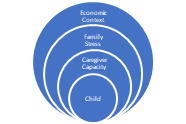 Intersecting Ecologies of Risk and Early School Adaption
Intersecting Ecologies of Risk and Early School Adaption
This study examines and tests a model of school adaptation under an ecological perspective which captures variation in economic context, family stress, and caregiver simultaneously.
Principal Investigator, Dr. Monica Oxford. NICHD: RO3 HD054428-01

New Methods for Coding Parent-Child Relationships within a Sample of Maltreated Infants and Toddlers
The purpose of this proposal is to assess a highly- innovated method for coding parental-child interaction that can account for child outcomes over and above traditional methods of coding caregiver sensitivity. Fragmented and Unpredictable parental behavior (FRAG). FRAG coding, discovered in labs assessing rodent caregiving models, was recently applied to a sample of human parent-child dyads. We will evaluate the utility of this coding method within a sample of maltreated infants and toddlers.
Principal Investigator, Dr. Monica Oxford, Research Intramural Funding Program, School of Nursing


Educare is a model of comprehensive, center-based early childhood education serving under-resourced communities. At the heart of the model is the belief that access to high-quality early education in neighborhoods where families live seeds opportunities for success in community, school, and life. Since 2000, 25 Educare schools have opened across the U.S. Together with leading advocates for increasing opportunities for children and families in under-resourced communities, these schools make up the Educare Learning Network.
Educare offers full-day, year-round education for children 6 months to five years old, engaging families as their children's primary champions. Schools share four domains of practice: data utilization; embedded professional development; high-quality teaching practices; and intensive family engagement. Emphasis on data use distinguishes Educare schools, making it feasible to conduct longitudinal research across schools (Educare National Research) and continuous program evaluation within each school.
Educare Seattle
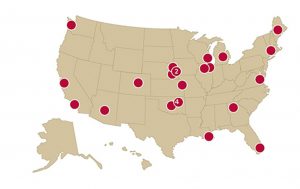
Part of a State-wide early learning initiative, Educare Seattle partnered with Puget Sound Educational Service District to make tangible a shared vision: Success for each child and family, eliminating the opportunity gap by leading with racial equity.
In addition to providing direct service, Educare Seattle was built to inspire and lift up early learning as a path to equity in our region. Consequently, Educare Seattle was designed to be a resource for parent leadership and advocacy, a training hub for early learning professionals, and a demonstration site for early learning practice and innovation in the Pacific Northwest.
Educare Seattle offers early learning services to 138 children and families in White Center, a vibrant and racially, culturally, and economically diverse community. Diversity characterizes Educare Seattle’s staff of early learning professionals as well. Their engagement in national research and continuous improvement has been guided, since 2009, by researchers at University of Washington’s Barnard Center for Infant and Early Childhood Mental Health.

Educare schools participate in a national study tracking child and family outcomes and program implementation over time. National evaluators at Frank Porter Graham Child Development Institute (FPG, University of North Carolina at Chapel Hill) coordinate the cross-site study and shared research agenda. The national and local evaluators collaborate in decision-making and dissemination of findings.
At each school, local evaluators use a shared timeline and collect a common set of measures, including direct child assessments, classroom observations, staff surveys, and parent interviews and surveys.
The Educare Implementation Study documents at school and aggregate levels:
• progress over time of Educare’s children and families
• experience of Educare’s early learning professionals
• school and Network development towards fully implementing core features
The majority of Educare children leave for kindergarten with social-emotional and academic skills to succeed. Children enrolled earlier, and for longer periods of time, demonstrate better outcomes (Yazejian et al, 2015). More information about results can be found at the FPG National Evaluation website and Educare Schools’ results.
Ongoing, large-sample research across early learning sites is a valuable, unique resource that
 • informs national practice and policy. During COVID-19, Educare network and data advanced quick learning and sharing of information within and beyond Educare schools. Together, they mobilized new supports for children and families, and informed quickly evolving practice and policy in the field.
• informs national practice and policy. During COVID-19, Educare network and data advanced quick learning and sharing of information within and beyond Educare schools. Together, they mobilized new supports for children and families, and informed quickly evolving practice and policy in the field.
• it prepares parents as their child’s best advocate in life and systems. Parents see, use, and talk about data in child conferences, “data events,” and hallway dialogues. Together with teachers and family advocates, they interpret and inquire. Data become familiar and their tool set for current and future advocacy.
A research-program partnership (RPP) between a local evaluator and Educare staff supports a culture of inquiry and regular use and sharing of data to advance learning, planning, and program impact. A research-program partnership helps sustain use of data to inform practice and goals over time.
Local evaluators from the UW’s Barnard Center participate in Educare Seattle school routines, family events, and trainings. They also guide embedded routines and services to support data utilization, including:
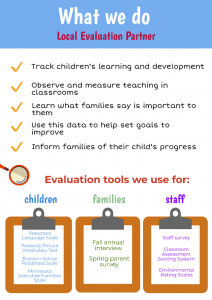 • Monthly RPP meetings for data dialogue and review
• Monthly RPP meetings for data dialogue and review
• Easy-access data dashboards with current and longitudinal information about children’s progress
• Participation and hosting of school events, like open houses, “hallway happenings,” and “Family data night”
• Data displays to stimulate questions and dialogue
• Support for teacher understanding and use of standardized classroom observation tools and technology
• Informative child progress reports for family conferences and children leaving for kindergarten
• Review of questions, measures, methods, and communications using an equity lens
• Engagements of staff and families in field studies and innovation grants, to test new ideas, practices, and measures
Information about Educare research and evaluation partnership is shared with families when they enroll in Educare and consent to participate in studies directed by University of Washington researchers from the Barnard Center. Following are examples of local materials used to stimulate questions and data dialogues among Educare Seattle families, staff, visitors, and stakeholders:
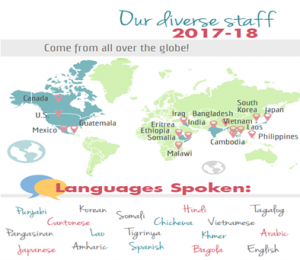
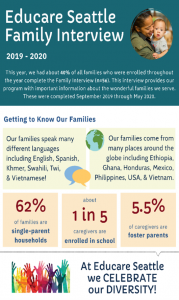
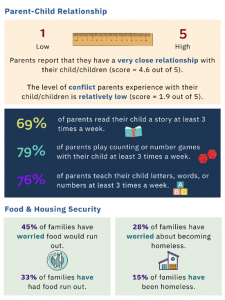
The Educare Network is a hub for innovation in early childhood research and practice. Schools and research partners brainstorm and collaborate to propose and test new ideas, accelerate progress, individualize efforts for local needs, and advance the field at large. This process promotes connection and synergy across and beyond the Network.

Seattle Educare parents, teachers, family advocates, administrators, and researchers have participated in the following 3 innovation grants:
Mindfulness and Mastery: Supporting Social Emotional Skills and Executive Functioning in Children, Teachers, and Families
Educare Seattle is in the third year of an innovation grant to support and test mindfulness practices that increase social-emotional skills and executive functions of children, staff, and families in Educare. This work is funded by an innovation grant from the Buffett Early Childhood Fund and coordinated by evaluators from Educare Lincoln and the University of Nebraska Medical Center. 
Together with 12 other Educare schools, we launched initiatives to address needs of children, staff, parents, and administrators. In partnership with the UW Center for Child and Family Well-Being, Educare Seattle provided programming to support resilience of parents and educators. Collectively, all sites measure process and impact, sharing training and learning among and beyond Educare schools.
The grant has funded implementation of the following activities at Seattle Educare:
• School-wide training in Conscious Discipline a trauma-informed curriculum advancing language and practices to support social-emotional learning
• Training 2 teacher cohorts in Brain Games, a program to increase self-regulation skills in preschoolers, toddlers, and infants
• Implementation of activities from Second Step (Brain Builder Games) and Creative Curriculum (Mighty Minutes) to promote self-regulation in PreK and toddler classrooms
• Teacher implementation of relaxation exercises and yoga in the classroom
• Implementation of REAL Pro, a program to reduce stress and increase resilience and knowledge of trauma-informed practice among early learning staff
• Administrators received 3-session REAL Pro training in school-wide support for mindfulness initiatives
• Parenting groups on resilience delivered to 3 cohorts at Seattle Educare
Findings to date:
• Teacher outcomes showed reduced levels of emotional exhaustion related to job stress from year 1 to year 2, and increased feelings of personal accomplishment.
• Cross-site level data showed increased mean child executive function (EF) scores from fall to spring, 2018-19.
• Child EF scores in fall, 2019-20 showed that more Seattle Educare children met age expectations following EF classroom practices than in the previous year.
Parent Ambassadors in the Educare Learning Network
Parent Ambassadors, a grassroots advocacy program for low-income parents, is grounded in an empowerment model of peer-to-peer education in effective advocacy for change. Over 12 months, parent ambassadors engage in training in communications, leadership, legislative advocacy, and grassroots organizing. They advocate at state and federal levels, training other parents in their programs.
 Since 2009, Washington State Association (WSA) parent ambassadors advocated for increased investments in children and families via Head Start and other programs. Testimony and work of parent ambassadors at PSESD and Seattle Educare helped pass ground-breaking legislation and child-friendly budgets. Word spread.
Since 2009, Washington State Association (WSA) parent ambassadors advocated for increased investments in children and families via Head Start and other programs. Testimony and work of parent ambassadors at PSESD and Seattle Educare helped pass ground-breaking legislation and child-friendly budgets. Word spread.
Building on their success, Educare Seattle used an innovation grant from Buffett Early Childhood Fund to co-develop a program for parent ambassadors at Educare Maine.
These efforts galvanized a subsequent 3-year innovation grant to continue building State-wide parent leadership and advocacy programs in Educare schools in Colorado, Florida, and Illinois. To accelerate the work, Educare Central Maine joined WSA Parent Ambassadors to develop a scale-up guide and a parent ambassador alumni program.
Parents and parent support staff across Educare schools continue to collaborate to seed an increasingly effective, diverse, and vibrant parent leadership and advocacy network for change, within and beyond Educare schools.
Early Science Initiative
Young children benefit from scientific inquiry as a pathway to satisfy natural curiosity and motivation to explore and understand the world. The Early Childhood Science Inquiry Project, developed by Dr. Darryl Greenfield at Educare Miami and the University of Miami, seeks to expand this pathway in both schools and homes, measuring the impact on learning of young children and the pedagogy and practice of early learning professionals and programs, especially in low-income schools and communities.
In 2017, Educare schools in Miami, Seattle, and Omaha piloted classroom practices focused on science instruction and job-embedded professional development. Funded by an acceleration grant from Buffet Early Childhood Fund, the pilot aimed to increase knowledge of science pedagogy among early childhood educators and evaluate impact on classroom practice and learning. Educare schools piloted a computer-based adaptive test of science concepts and methods used with PreK children.
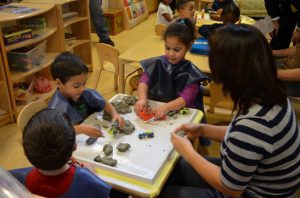 Mentor teachers, followed by preschool, toddler, and infant teachers, implemented activities using science as a platform for deep inquiry, reflection, and collaboration about teaching and learning. Other Educare schools joined later phases of the grant, which engaged families with science activities as a platform for home-school connections and enhanced learning. More information about the early science initiative can be found at https://www.earlyscienceinitiative.org/
Mentor teachers, followed by preschool, toddler, and infant teachers, implemented activities using science as a platform for deep inquiry, reflection, and collaboration about teaching and learning. Other Educare schools joined later phases of the grant, which engaged families with science activities as a platform for home-school connections and enhanced learning. More information about the early science initiative can be found at https://www.earlyscienceinitiative.org/
Activities
· Seattle Educare mentor teachers participated in training to expand pedagogy and science activities in PreK, then toddler and infant classrooms
· Seattle Educare teachers in PreK and toddler classrooms co-constructed science lesson plans to implement, then share across Educare pilot schools
· Seattle Educare classroom teachers participated in multi-site trainings on science learning and teaching in the early years
· Seattle evaluators piloted use Lens on Science, an Item Response Theory (IRT)-based, computer adaptive test of science concepts and methods for PreK children

